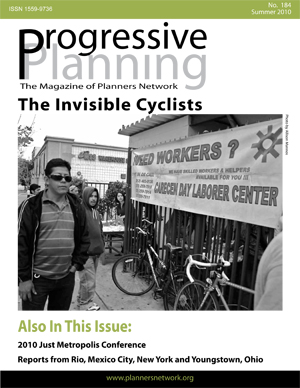By Tom Angotti
Shortly after the Towards a Just Metropolis conference in the Bay Area, the U.S. Social Forum convened in Detroit. Between June 22 and 26 some 20,000 people got together there, nearly doubling the attendance at the first forum in Atlanta in 2007.
While architects, planners, and community activists seriously networked at the Bay Area confab, the Detroit gathering was a gigantic networking extravaganza in comparison. Billed as “a movement-building process” and not a conference, the U.S. Social Forum was filled with thousands of self-organized workshops, assemblies and plenaries.
To some extent this apparent chaos was intentional. In order to nurture political and social diversity, the structure was kept fairly basic and efforts to get people to commit to bigger political projects were minimized. Since the first World Social Forum in Porto Alegre, Brazil, that global enterprise, dedicated to the proposition that “Another World is Possible,” has had to deal with opportunistic moves by some well-funded political groups and organizations to impose homogenizing discipline and stifle the voices of the most excluded. The world forums confront even more serious barriers than the national and regional forums because deep language and cultural barriers often prevent basic communication so English—the premiere language of the powerful—dominates.
The U.S. Social Forum is dedicated to building a “multi-racial, multi-sectoral, inter-generational, diverse, inclusive, internationalist movement.” It is a powerful but beginning attempt to start dialogues and networks at a national level while remaining conscious of the formidable role of the U.S. in promoting war and unequal development throughout the world.
But is this networking enough? At a recent report-back from Detroit held at the Brecht Forum in New York City (which I moderated), seasoned activist Rob Robinson of Take Back the Land expressed frustration that there were so many self-organized workshops on the same topics. Didn’t the organizers of these sessions talk to each other in advance? What does this say about the state of the progressive and left forces nationally? If people are not aware of individuals and groups in other cities and states that share the same concerns and have similar experiences, isn’t organizing for a national conference an ideal way to bring people together in a dialogue that covers common themes? Wouldn’t this kind of organizing promote common action and solidarity instead of reinforcing the isolation and fragmentation so common in our movements? In other words, what good is a national conversation if everyone’s in a different room? Will this ever lead to action?
Networks, from small groups like Planners Network to the much larger U.S. Social Forum, are really more complex than this, and while the loose organization that characterizes them may appear to be a liability, it can also be a necessary and useful tool for building alternatives. Still, networks can be counterproductive if the networkers lose sight of their political role and detach from action. Many networks arose in recent decades in the wake of the collapse of major left organizations and parties. Planners Network filled the gap left by Planners for Equal Opportunity. The World Social Forum arose as the socialist and communist parties, and the socialist camp, faded away, helping to implant the notion that there are other alternatives to global capitalism. Conscious of the mistakes made by the old left, particularly a blindness to participatory democracy, networkers have sought to restrain the forces from within our own ranks that seek to impose new, stifling orthodoxies. Given the historic role of racism and xenophobia in the U.S., networks also have a responsibility to insure that leadership by progressive people of color not be displaced.
But there are some serious problems when networks become the main or only format for action. We need to realize that networks exist both as a sign of our collective weakness and because there are no serious alternatives. In the U.S., we have well-funded efforts by the Democratic Party to convince us that they are the only “practical” organized alternative. They treat our networks the same way the Republican Party treats the Tea Party, as an escape valve, a mine for new ideas and a font for votes when an election comes around. They have a vested interest in guaranteeing that we won’t grow or threaten their own hegemony. The monopoly of the two parties and their corporate media outlets stifles serious political alternatives—not only third parties but any independent political organization. In this nation known for its pragmatism, the Democrats constantly remind us how important it is to line up for the next piece of watered-down legislation while they turn their backs on grassroots demands for fundamental changes that guarantee basic human rights—to housing, to healthcare, to the city—and an end to corporate control over our lives. This is further reinforced by the foundations and charities that fund “social change” initiatives, many of them with openly progressive aims, that orchestrate and limit protest to extract short-term concessions and at the same time turn away from the solidarity needed to bring about wider and more fundamental change.
At the global level the limitations of networks are even more striking. Too many existing networks depend on funding from wealthy northern countries and are dominated by educated elites who easily navigate global institutions and speak the languages of the dominant cultures. Even when they are personally committed to radical change, the elites are drawn into the interminable establishment conferences dedicated to poverty-reduction (every funding recipient now has to have a “pro-poor” growth policy), global sustainability, food security, indigenous rights and more. Instead of supporting political power for the historically oppressed, their institutions and funders support networks that drain human and financial resources from the grassroots efforts that seek a deep social and political transformation.
In the end, networking and communication is neither progressive nor backward in and of itself. Rob Robinson’s take on the U.S. Social Forum provoked controversy and a much-needed discussion about the real politics behind our propensity to network. This is worth some added discussion in Planners Network.
